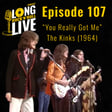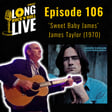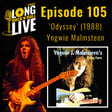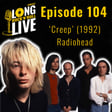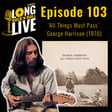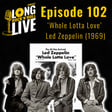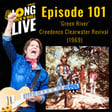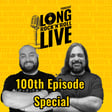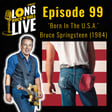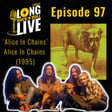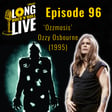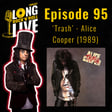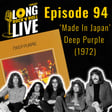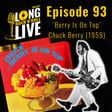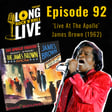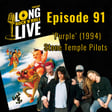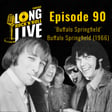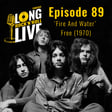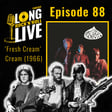Introduction and Episode Kickoff
00:00:12
Speaker
Hello there and welcome back to another episode of the Long Live, Rock and Roll Podcast with your host Mr. Lasmy Kalidi's here and on the screen opposite me Mr. Felipe Amarin. How you doing bro? Doing great brother, how are you? Good, yeah I'm very well, thank you very well. Hello everyone. For another episode, nice mug.
00:00:28
Speaker
Oh, very good. Where'd you get that? The Star Wars mug. Oh, no idea, man. I've got so many mugs. Don't even remember where they came from. I've got so many Star Wars mugs. Yeah, it's just too many, too many to count. Well, welcome back to listeners and viewers. If you're watching us on YouTube, make sure to like the video and subscribe so you stay up to date with new releases.
Rock and Roll Music Discussion
00:00:46
Speaker
And if you're listening on the podcast and you Spotify your app, we'll make sure to go down and give us a review so that we go up in the charts and seem to more appropriate people who like the rock and roll.
00:00:56
Speaker
speaking of rock and roll today we are speaking about going up in the charts speaking of rock and roll and going up in the charts um we i decided i chose an album today that i thought you know as you've all heard through various episodes you're almost almost 70 episodes in now you've heard us refer to things like pink floyd um audioslave black sabbath all as rock and roll and
00:01:23
Speaker
premise is, I believe we firmly identified why we think it's rock and roll, it's the freedom of music, it's about doing something that you think is a bit different, a bit unorthodox, that sets you apart from what was going on in the time. Now we're going to do some actual rock and roll, and we did a few episodes ago, quite a while ago with Bo Diddley, so we thought we'd choose another key rock and roll album, so I've decided this week we're going to do
00:01:47
Speaker
or the other side there you go. Here's Little Richard by Little Richard. So I'll just kick off with a bit of the information. This was released on the 4th of March 1957, recorded between September and October 1956.
Introduction to Little Richard's Album
00:02:00
Speaker
The genre is obviously rock and roll. It clocks in at about 28 minutes under the specialty label and it was produced by Bumps Blackwell. Felipe just
00:02:12
Speaker
Go ahead, crack on with it. First, I want to say what you said about rock music versus rock and roll. Because all the other bands we've mentioned, all the stuff we normally talk about, they normally refer to as rock music, but rock comes from rock and roll. So it's always good to go back to the roots of
00:02:36
Speaker
the genre and talk about those guys. Yeah, so it was the first time I've listened to this album start to finish. I knew the singles of course, who doesn't know like Slippin and Sliding and Long Tall Sally and you know those songs are really really famous. But when you listen to them in context you see like it's
00:02:58
Speaker
for me it's like you've been invited to this amazing rock and roll party in 1957 and just you know it just walked into someone's house and they have the record they're spinning all night and I reckon if that album was playing all night on repeat at a party I wouldn't leave the party just saying. And I don't think anyone would say oh this has been on for a long time, is she fancy changing it?
Little Richard's Energy and Performance Style
00:03:27
Speaker
not turning this album off no yeah i completely agree with you man it has that good vibe happy party feel to it i mean not all the songs are exclusively about um positive themes and lyrics per se but yeah each song does have its its own happiness its own joy towards it and i think that's just um
00:03:50
Speaker
I wonder if that's part of just Little Richard himself, because he seems like such an outgoing and vibrant man with the energy he bought to playing the piano and writing his music and performing. I wonder if that's just part of him. Yeah, all of that seems really genuine. It seems like that's his real character. Although there is a character there, there is like all the
00:04:18
Speaker
the outfits and the way he performs on stage. There's a lot of it that's planned, of course, but he seemed to have that energy going on. And there's lots of people who refer to him, I mean, talking about his music, they would use the word energetic.
00:04:35
Speaker
And I think, and if I can describe him in one word, I would say relentless. So it's just like smashing the piano all the way through and shouting all the microphones. And at some point you think, okay, this is gonna become repetitive at some point, but you just want more and more. And I think that's
Historical Context of Rock and Roll
00:04:56
Speaker
I agree with you. I think that there does get a point when you get to like, when you hear that you're getting the same kind of rock and roll about four songs in, you kind of think, well, as this goes on, am I going to start getting a little bored of this? Am I going to start to just, oh, he's just, he's just taken this kind of rock and roll and rehashed it again, but it never gets boring, does it? It's a really great album.
00:05:16
Speaker
Just a bit of background on this album. So during the 1950s, you've got rock and roll emerging as a genre in and of itself, really establishing, branching off of the soul, the blues, the boogie-woogie, the gospel, coming together, amalgamating and presenting us with rock and roll. Now, these are some key rock and roll moments in the build up to this album that I thought would be really interesting to put. So Elvis's rise to fame.
00:05:43
Speaker
You got Heartbreak Hotel and Hound Dog, 1956. Chuck Berry's Emergence with Maybelline in 1955 and Roll Over Beethoven in 1956. Bill Haley's Rock Around the Clock, 1954, which was basically an anthem for emerging rock and roll.
00:05:59
Speaker
Fats Domino bringing his New Orleans piano-driven sound into Fray with you know Ain't That Shame 1955 and Blueberry Hill 1956 and then finally you've got the birth of Sun Records that really bred the rock and roll talent, your Elvis, your Johnny Cash, your Jerry Lee Lewis, your Carl Perkins and all of this is this lead up to Little Richard coming in 1957 with this album and the reason I think it's important is because
00:06:25
Speaker
I can hear elements of everything I've mentioned in this Little Richard album. You've got the energetic stage persona of Chuck Berry. You've got the gospel influence of Elvis. You've got Fats Domino's kind of bluesy piano playing in there and Bill Haley's guitar driven energy as well. And I think it was just important to understand that
00:06:49
Speaker
This album, Here's Little Richard, really did take the best parts of rock and roll leading from 1954-ish to 1957 and saying we'll take that bit, we'll take that, that one and that. Boom, here's
Unique Blend of Blues and Rock
00:07:02
Speaker
our rock and roll.
00:07:03
Speaker
Yeah, it really sums up what rock and roll was at the time. On 1957. Yes. And that's like, because you can always argue that like Bo Diddley and Fats Domino were still doing a variation of the blues. Although I think Fats Domino is really rock and roll. But then when Little Richard comes about,
00:07:32
Speaker
You've got the blues chords, you've got the blues rhythm, but the almost aggressive way that it plays the piano, and I think the happiness on his vocals and the lyrics, that's what differentiates him from the blues.
00:07:51
Speaker
Because you think about blues music, you think about sadness, you think about suffering, and you think about everything that's related to that style in its roots. And then
Androgynous Style and Influence
00:08:01
Speaker
rock and roll is more about having a good time. And America in the 50s, post World War II, America was doing well in terms of economy, right? So people buying their nice cars, driving around town.
00:08:13
Speaker
And I think the album's got that vibe. Chuck Berry has a lot of that. But I think, yeah, what makes it particularly special in this case is the amount of hits in a single album. It's too many hits to the point that he never made it to the same point in the chart, I guess. He never made it that high in the charts ever again.
00:08:40
Speaker
because he just had so many. Well, the first album was just like, yeah, you know, the first album was just so good. He never reached the same amount of success in terms of charting albums, you know, so, uh, but yeah, but it's, it's, it's impressive that he's got so many hits in a single album. The other thing that I think stands out as well is the,
00:09:08
Speaker
his persona and the way he dresses and talks I mean he's often described as flamboyant and a good word is androgynous which actually you know I just want to get the I'm going to get the definition up just so I don't get it wrong. That's got to go full on dictionary mode. Well I just I know genders and everything are a sensitive topic nowadays so I don't want to get anything wrong
00:09:34
Speaker
So androgynous, the quality or state of being neither specifically feminine or masculine. So we're not talking about whether he's a female or a male or what he identifies as, it's just the way he conducts himself. And I think this goes down to his look. His face
00:09:52
Speaker
It's weird because you can look at loads of photos and you could, if you showed someone and you said, you know, tell me if this is a man or a woman, I think you'd be split down the middle in terms of people wouldn't really know because that's definitely mustache in the beard. Yeah. But you know, he's got a very feminine face and the way he performs his flamboyance and his energy, the way he walks around the stage, it just doesn't have that out and out masculine feel, which is what was quite prominent in the fifties men.
00:10:20
Speaker
acted like men and
Rock's Role in Racial Integration
00:10:21
Speaker
women acted like women. Now I'm not saying that there was never any crossover, you know, but for the media, for the mainstream, yeah, for the mainstream, the roles were kind of like, or that's like Elvis was sold to the female audience. Exactly. Really like a masculine model in a certain way. Chuck Berry as well, you know. Yeah, Chuck Berry. Yeah, exactly. I think maybe, I mean, he's considered like one of the pioneers of the queer, like,
00:10:49
Speaker
I'm gonna put it queer expression whatever in music but I think it's much more than that because he's not, I think he's everything, there's a little bit of everything, it's about the energy and that energy is human more than anything else. So what you say like some of the lyrics are quite masculine
00:11:11
Speaker
But in the end it's about let's have a good time, let's enjoy ourselves. And I think he was into partying big time and his personality comes across in the music in that way. But yeah, things you're going to see, you're talking about being androgynous and all this stuff, you would see that with David Bowie about so many years after that.
00:11:37
Speaker
Well, Bowie was massively influenced by Little Richard and a few others as well. Let me have a look. I'm mainly going for who was influenced by him because of his androgininity. I don't know. Androgynousness. We need a dictionary for this show now. Prince, David Bowie, Mick Jagger, you know, all kind of have that really, you know,
00:12:02
Speaker
We know what they are, we know their men, we know they identify as men, but just having that flamboyance and that energy and that determination to wear clothes that they want to wear without having to say, okay, well, I need to wear a suit because I'm a man. David Bowie wore dresses often. That prints have incredibly sort of, what's the word?
00:12:25
Speaker
I've forgotten the word, it's not male or female, but costumes and outfits. And you know, Little Richard is the one who said, we can do this in music. Yeah, exactly. And I think, yeah, and it's probably why he's the first one that people would remember doing that kind of stuff. But when you look at it, like when you get to the point, you have like Glen Rock, which is sometimes, I'm not saying all the time, more about the way people dress than the music itself.
00:12:54
Speaker
So he got to that, so rock music and fashion have been connected like for a long time but as you said before Little Richard was like this is how the boys are gonna dress, this is how the girls are gonna dress, that's the kind of music the boys are gonna sing, that's the kind of music the girls are gonna sing. The same way we said that Elvis was the guy who destroyed the barriers between what people would call white or black music, it's like this is rock and roll
00:13:24
Speaker
And I think Little Richard did that with the masculine and feminine sides of music. I think,
Rebellion in 1950s Youth Culture
00:13:29
Speaker
yeah, so I was going to say, you mentioned the thing about the racial integration, and I think this album also needs to be credited with that as well, because, you know, we said it with about Elvis when we did Elvis's first album, and I don't think it's a problem at all to say that this is another one of those albums, because this album was popular among black people and white people.
00:13:49
Speaker
now but in the days leading up to it, in the years leading up to the 50s and rock and roll, for those who don't know you've got to understand rock and roll was quite a unifying musical genre because before that you'd have pop music that was, I mean I don't even know how to describe it, it was the show music, big band jazz, pop music that would just be one vocalist singing with an orchestra behind them that would often be playing jazz music, you'd have classical music as well and there was an unwritten
00:14:22
Speaker
An unwritten category that you'd listen to if you were a black person or if you're a white person. Now, I'm not saying black people didn't listen to classical music, but the idea was that classical music often was listened to predominantly by white people back then.
00:14:38
Speaker
I think the whole thing with mainstream media in general, I'm not afraid to say this, they're generally really stupid when it comes to what people really want and they just try to decide for people. Oh, if you are this age of this skin color or this whatever, from this cultural background, you should listen to this. So I think sometimes there's a mainstream kind of
00:15:10
Speaker
will to decide for people what they have to be. So you can only listen to this if you are like this. And I think that's the other side of rock and roll, which is like, we just want to listen to good music and dance and have a good time and be free artistically and in life.
00:15:30
Speaker
and it's people like Elvis and this album that help to break those barriers down and say do you know what this music is for everyone it's not for someone black someone white for everyone and then is where the mainstream understands that oh wait a minute like it's commercially better
Musical Techniques and Innovation
00:15:46
Speaker
is buying it. So in the end, it always works. But yeah, too many hits for a single album. I know. I mean, how do you want to do this, bro? Because we can talk about some songs, but I've just got a bunch of legacy topics that I want to cover. Let's talk about how this album influences people. Because the songs are quite similar, aren't they?
00:16:10
Speaker
Yeah, I want to talk about what connects the songs, what makes them, let's say, sound very similar, but also what makes them different. Just for listeners and viewers, any song we've mentioned, including those first ones that I mentioned about Elvis and Chuck Berry,
00:16:31
Speaker
They're all going to be in a playlist for you, which is going to be in the show notes at the bottom. So if you open your description on YouTube, click show more on Spotify and Apple, and you're going to see the show's description and a link to the episode playlist, which will have this album in and all the other songs. You can listen and be prepared for this discussion. Yeah, sorry, bro. You were saying about the legacy.
00:16:50
Speaker
Yeah, like I said, I've sent you a quote, didn't I? Robbie Robertson. Yeah, from the band. Basically, he said the song Ripper Up, he was addicted to listening to it over and over, and he says, it's the perfect shuffle, which, if you don't mind, I'll speak about this specific topic, shuffles, because there's a, well, this is a difficult thing to talk about in a show like this, because it's like,
00:17:19
Speaker
We don't want to go into music theory, but there's a difference between shuffle beats and straight beats, which I mean pop music nowadays, most things are straight, while shuffle is anything that's got a swing. So the shuffle swing comes from the early jazz and blues songs and Western swing, which is country music basically. And all of that, all the swing feel was
00:17:49
Speaker
present in the first rock and roll albums. And in this album there is a swing in every song. The drums are swinging. Sometimes it even almost clashes with the pianos, almost like the piano is a bit more straight than the drums. The main beat for the album is a shuffle beat straight through. So the interesting thing about that is
00:18:15
Speaker
Not only the shuffle was made popular by Blue's artist, the shuffle beat, but- Do you wanna- Sorry, bro, do you wanna discern for the listeners, just do a very quick demonstration of what a straight beat is and what a shuffle is? If this comes from the microphone, so a straight beat is something more like you count one and two and three and four. And the shuffle, one, two, three, four, that's a shuffle. But played really fast like Little Richard does,
00:18:43
Speaker
that swing becomes even more characteristic in a certain way because when it's too fast, those two things straight and shuffle, they get fairly similar at fast tempos, but you can tell when it swings and when it doesn't. So it really impresses me that the whole album swings and the whole album is generally fast-paced. But anyway, we're talking about the legacy. I want to talk a little bit more about the structures and stuff like that.
00:19:12
Speaker
That's fine. Well, no, I mean, since you've done that, we'll, we'll, yeah, I had a section. So we've done racial integration. We've done gender expression. We've done a bit about musical influence. Again, this is what I want to touch on. But in terms of musical innovation,
00:19:29
Speaker
We have this new style of rock and roll as I said that was characterized by raw energy, infectious rhythms, catchy melodies and really dynamic vocals. Now this
Influence on Future Genres and Artists
00:19:38
Speaker
is what musicologist Lee Hildebrand had to say about the swing and shuffle in the album which Felipe has just touched on. Swing and shuffle beats had been the primary pulse of rhythm and blues until Richard introduced the even eights that would come to drive most R&B and rock music.
00:19:57
Speaker
What does that mean to you? So that's the straight eights or the eighth notes or quavers here in the UK, which is like two notes per beat. And that's the straight beat. So that's what I'm saying. There's almost like a clash between, I wouldn't say he's playing proper straight eights all the time. I think his swings as well, but there's, you're saying the speed of it.
00:20:16
Speaker
Yeah, exactly. Also, you can play like Chuck Berry did a little bit of that, like a straight guitar with the shuffle drum beat behind it. So that kind of conflict is kind of the transition as well between jazz and blues into rock and roll. So things got more straight in terms of rhythm with rock and roll, especially further down the line when when you get to hard rock and other genres.
00:20:43
Speaker
or sub-genres of rock and roll, then you have much more straight music, especially in the 80s, from the 80s until nowadays. So you don't hear that many hits in the radio today. There are shuffles, right? It's not that common.
00:20:59
Speaker
Oh that's a whole episode we could talk about Shuffle's. Shuffle versus straight. Yeah yeah but the whole thing yeah but yeah so I think there's that like the way he plays the piano is it could be interpreted as more straight but I think there is an element of swing in every single song of the album. Yeah another is undoubtedly. One of the last bits I'm going to touch on before we go on to what you want to talk about is youth rebellion and it's just it
00:21:27
Speaker
that there's certain albums, even though they may sound similar, I'm thinking Elvis's first album that didn't really promote rebellion that much. And I'm not saying this one is like a rebellious album, but Elvis's album was organized and structured
00:21:52
Speaker
And it didn't have the feeling that I feel with this album in the sense of someone said to little Richard, Richard, go, go wild.
00:22:03
Speaker
perform how you want, do your thing. Whereas I feel Elvis probably, maybe from some outside factors like the record label, his manager, whatever, I feel it was more controlled. Whereas Little Richard here is showing and capturing the spirit of rebellion in the 50s youth culture, really resonating with young people who are just seeking some sort of freedom and self-expression kind of against what society and their parents and the elders of 1950s America would have
00:22:33
Speaker
tried to shoehorn them into.
Comparison with Elvis's Style
00:22:35
Speaker
Yeah, it's almost like the rebel side of Elvis was organized in a way that was, was planned in a way that could be, he could be a rebel enough to be a rock and roll star, but within the
00:22:58
Speaker
the control of the labor and the management and all that stuff, because everything in Elvis career was designed to be a huge success. So he wasn't, he was meant to be the biggest star of rock music from the beginning. Everything had a plan behind it, I believe. And I think, so with Elvis, you have this more, I would say more commercial side of- Can I add something to that?
00:23:25
Speaker
I just want to add that I wonder if Elvis' rebelliousness was in his lyrics. Probably. Compared to the performance of Little Richard. Yeah, but he wasn't a songwriter really, wasn't he? Who Elvis? Yeah, he was singing mostly someone else's music. That's true, yeah. You could associate the choice of songs with
00:23:49
Speaker
with the with the attitude but I'm a big Elvis fan by the way though there's not so what I'm saying is like and I actually like the fact that everything seems to be so organized in a way that actually pushed him into stardom like that so but with Little Richard it's more like I don't think you can't
00:24:09
Speaker
I don't think it's possible to control a guy like little Richard. I don't think you can put that guy in a recording studio and say, man, you're just going to do this, but can you do it as slightly more like radio friendly? He was like, he sounds so chaotic.
00:24:26
Speaker
and so energetic. And as I said before, he's relentless. He's like that all the time, nonstop. So I think there's a much more honest thing about his music than most artists, even the guys who were doing the same stuff in the fifties and sixties. Perfect, sweet. All right, man. Well, I've
Legacy and Cultural Significance
00:24:47
Speaker
got one more legacy thing, but we'll do that in the end. I think that's kind of a nice thing to leave it. Do you want to crack on with what you were saying about, what did you want to talk about music wise?
00:24:54
Speaker
I would say something about the blues structures that he uses in the songs. And nearly every song there's a blues progression, isn't there? Yeah, most songs in the album are 12-bar blues. So that kind of music, again, I don't want to go too theoretical on this, but it's basically have 12 bars of music, one, two, three, four. That happens 12 times.
00:25:15
Speaker
and the chords that are played over those 12 bars, they just repeat. So we have a loop of 12 bars. So some people... I'm going to find an easy
00:25:28
Speaker
an easy demonstration of 12-bar blues on YouTube and I'll put it in the description. So anyone who doesn't know what 12-bar blues is or how it works, I'm gonna find a nice easy video explaining it and I'll put that in the description, okay? Please carry on. In a simple way you have three chords played in a certain progression over those 12 bars and that repeats itself throughout the whole song so it doesn't matter if the verse or the chorus
00:25:51
Speaker
is the same thing. It's like you're trapped in those 12 bars until the end of the song. And some people might say that's an easy formula to follow because you can write a million songs with the same chords and the same amount of bars. But here's the problem with that. How can you be creative with such a rigid structure? It doesn't change. So
00:26:19
Speaker
In order to create a powerful melody and fit the lyrics into that form and make it sound different every time, you gotta be really good at what you're doing. You gotta be a master of your craft to do that. And I think that's one of the most powerful things about the album. He can do 12 bar blues like one after another, but it's rock and roll and it's his own thing.
00:26:40
Speaker
I just find that, to be honest and say that blues is not my go-to genre, and I think you know this, despite the fact that we've played lots of blues together, I find the same sort of blues to be a bit repetitive. Put it this way.
00:26:57
Speaker
When I'm with you at the Blues Bar and when we play at the Blues Bar is great because the atmosphere, the vibe, everyone there just loves the blues and they want to get up and they want to show their form of the blues what they love about the blues, you know. But when I listen to, if you ask me to listen to an album of the blues by the same guy and I'm just nothing against this guy, but just for example, Muddy Waters.
00:27:18
Speaker
Because of his voice and his guitar playing, because it's all unique, because he's got his own way of doing it, I don't think I could listen to a whole album of a Muddy Waters album and come away loving it, because I just get a little bored of it. I find it a little repetitive. And I was really surprised when I got to the end of this album, Little Richard, and said, hold on, that was all the blues.
00:27:42
Speaker
All he does is he embellishes it differently. You've got some with some backing vocalists that are like gospel female singers. They're beautiful. You've got brass and saxophone and trumpet and whatever in some of them that are just playing sort of little counter rhythms, counter melodies. Some of them are slower. Some of them you've got the emphasis on the piano. You know, he takes a little bit of Fats Domino's inspiration there.
00:28:06
Speaker
And I just thought that was really clever. He really took the blues as the bass, B-A-S-E, of the music and added so many little nice touches around it. And that's what I thought kept the album really interesting. Yeah, I think that's what it is. He was a master of playing those 12 or 8-bar blues, which is something that maybe only happens once in the year. And the album, which one is an 8-bar blues? It's all my notes, so I wouldn't forget.
Vocal Range and Musical Elements
00:28:36
Speaker
Yeah, it's the third song, Can't Believe You Wanna Leave Me. So that's an eight bar blues with stops. So here's the thing, he does a lot of that, which is stops during the verse. So the whole band stops, he sings a line, there's another hit and stop and sing. So all those formulas were there. Some people have done it before, but the way he's done it is so unique. I can't even tell what's the main difference. I think it's just his character is so strong that
00:29:05
Speaker
it just overpowers everything around it and I think like there's some interesting formulas that he uses in the album or the producer does as well which is like you have the brass doing the riff with the piano that happens a lot the starts and stops you know that happens a short sax solo so you don't have piano solos in the album
00:29:31
Speaker
You know, is it? Yeah, you're right. And that's weird because he is he is primarily known as the picture behind you for his piano playing in his high energy. But it never it never it never materializes into solos, does it? It just is just another little layer.
00:29:46
Speaker
Yeah, exactly. So basically he uses the piano more as a rhythmic instrument than anything else, which is brilliant, right? Which is not what you have primarily in jazz music when you have the pianist as a soloist and in classical music when he sometimes might have the piano as the main voice.
00:30:07
Speaker
he's using the piano to serve the melody rather than to be in your face all the time although he plays in such a way that the rhythm is contagious so you can hear the piano it is powerful but it's not necessarily like the soloist it's never the soloist. Yeah it's not overpowering it's never too loud it's perfectly placed in the mix and talking of the mix actually I thought the mix was really quite interesting because you
00:30:34
Speaker
You're going to find that outside of rock and roll with other pop artists of this era, they'd have a much more refined, well-produced sound. Now you've got to remember it's still only the 50s, so it's not going to sound immaculate, but I just love the
00:30:46
Speaker
kind of raw energetic feel that this album had really just felt like I mean I don't think they were all in a room together but it did feel like that felt like the whole band were kicking and swinging together little Richard at the front just doing his thing it sounds like they were in the room together because you can hear how the the the overall volume goes up for the solos for the sax solos
00:31:06
Speaker
Oh really? So you think they were in the room together? I think they changed that. The mix just goes slightly louder for some of the solos. I think it's a resource they use to compensate the fact that it's really hard to make the sax on its own to stand out to the mix. Yeah. One thing I wanted to talk about, and this is excellence. So for listeners and viewers, if you guys care, Felipe is the one who introduced me to Formula One.
00:31:37
Speaker
And yeah, and since then we've had many a discussion about Formula One and all this and, you know, being a new fan of it, I've come in and asked Lee Pail these questions. And when we talk nowadays about Max Verstappen and Charles Leclerc and all those great drivers now who are hitting,
Cultural Contributions and Influence
00:31:54
Speaker
who are making every lap they do within a specific time range, that shows how good they are as drivers. They're nailing it, they're going as fast as they can and getting the same sort of time every time they do it.
00:32:07
Speaker
The track lengths on this album sit between 2 minutes 02 and 2 minutes 42.
00:32:13
Speaker
Wow. An average of two minutes, 21 per song. So I just thought that was fun. Like a racing driver who can kind of do the same thing. Yeah, exactly. That's what I meant. That was the comparison for anyone who didn't get it, is that he's just done it. And the point is, is that Little Richard wrote a lot of his own songs. A lot of the songs on this album are written by him, a little over half for sure. And I thought that's fantastic. I mean, it's a debut album and he's found this formula
00:32:44
Speaker
of blues progression with all these other little instruments added in. Nice energy. We'll talk about things like the vocals and the lyrics and stuff in a bit.
00:32:53
Speaker
but all within like a 30 second, they've all either two minutes or two minutes 40, somewhere in between there. Brilliant stuff. I mean, just honing in and saying, I know what I'm doing. That's a statement there, isn't it? It was kind of common to have like short songs at the time, but the specific length of the songs, it's...
00:33:16
Speaker
It's mind blowing isn't it? Such a short range from 2.0 to 2.4. I don't notice that. It's just for people who might, you know casual listeners who might also watch sport. I'm just liking these analogies because it kind of, you know, when they tell you that
00:33:35
Speaker
Oh, Harry Kane scores, on average, he scores at least once every game. You think that's bloody good, he's done well there. I think this is the same because you're keeping that perfect radio length song time, never drifting over it, never even drifting under. Because if you do a song under two minutes, that's my point. If you do a song under two minutes, you're thinking, oh, could they have done more there? Could he have put more? Could there have been another verse? Could there be a solo? No.
00:34:04
Speaker
That's what it is. That's what it is. I don't know with this album. Yeah, it's brilliant stuff. Yeah, it does it so well. Yeah. Yeah. Any particular topic you wanted to move on to now? Well, in regards to the songs, I actually want to talk about some of the songs and some of the. Actually, I have a question. I'm pretty much asking you this question every time. Do you have one favorite song from the album? I have two questions, actually. That's the first.
00:34:39
Speaker
I can't believe you want to leave me. I think that's my favorite. That's kind of the ballad of the album, isn't it? Yeah. Okay. That's question one. Yeah. So the second one is, which song surprised you? Does it have to be okay? Yes. Okay. Right. Can I tell you why? Can I tell you why it surprised me? The song, Oh, why track number nine. Great. And let me tell you what, can I tell you why it surprises me?
00:35:05
Speaker
Number one, it's got these really unusual stops. It stops, but the stops sort of lingers, doesn't it? It's not like a blue star where it's like, and I have a date that ain't that it's not, it's just this one stop. And then he just sings frages before the music comes back in. And the second, do I want to save this now? Go on, you say what you have to say and then I'll bring up my other point about it. I agree with you. OY was one of the songs that surprised me because
00:35:34
Speaker
The vocals are slightly more jazzy at the beginning and more dramatic. So I said I was going to save my point but I'll tell it now. I've got written here in OY and I must admit in other places of the album you could mistake his voice for Nina Simone.
00:35:50
Speaker
Ah, that's really interesting. I heard OY and I went to Spotify and I went, hold on, has it just has it shuffled? Has it gone something up? No, it's him. But in his vocal tone, I can hear Nina Simone, which is unbelievable. That jazzy female tone. Yeah.
00:36:08
Speaker
Jazzy bluesy, isn't it? Jazzy bluesy, but female, that's the big point. We've got Little Richard in songs like Long Tall Sally, really, really, you know, presenting us with his manly vocals and the way, you know, some of them he does these screams where he's like, yeah, really manly, really raspy. And then in OY,
00:36:26
Speaker
I did mistake him for Nina Simone. Unbelievable. Never heard that comparison, but I can clearly hear it. It makes sense. I'll put a Nina Simone track in the playlist for everyone. Yeah, last can't be wrong about this. It's interesting really because he's got that on the verse and when the whole band joins him,
00:36:50
Speaker
his vocal just changes the way he reacts to like having the full band behind him and the way he sings in a different way when he's singing kind of a cappella or with less instrumentation and when the whole band comes in he changes it so it's a really uh i'll tell you it's the most unpredictable melody and lyrics in the album and arrangement
00:37:12
Speaker
Yeah. In my opinion, I just think it's arranged unusually, but it still works. Yeah, yeah. And I have a song that I really liked that surprised me, which is She's Got It, which is the last one. Yeah. It's got that formula of stops and starts, right?
00:37:30
Speaker
on the verse that happens like all the time, but he managed to fit about eight lines of vocals in the first eight seconds of the song.
00:37:44
Speaker
That's like a rap singer, isn't it? Bro, oh, I'm so glad you said that. Sorry to interrupt you, Gordon. You know, it's just that, like the pace of the vocals is so insane on that song. It really surprised me. It's more melodical, I would say, melodic than rap or other genres that people just speak really fast. There's this singing, there's a melody to it. But it's as fast as those guys, you know? It's like Eminem. Yeah.
00:38:12
Speaker
Well, track four, Reddy Teddy, I've got written there, hits in the music with almost rap-like vocals in between. That's it. Amazing, bro. This is just one of those episodes where we're agreeing with everything. It's flowing really nicely. Yeah, which might make a boring episode because I think people like when we disagree on stuff.
00:38:35
Speaker
Yeah, that's a great point. And whilst we're on that, let's talk about vocals, because that was one of the standouts for me. I mean, first of all, his vocal delivery. How technically good is his voice? Yeah, because I think you don't. When you listen to guys like Chuck Berry, Bo Diddley,
00:38:57
Speaker
You don't come away saying, now that's a vocal performance. You come away saying that's rock and roll, that's energetic. Did you hear Chuck Berry's guitar solo? Amazing. I come away from this thinking, my God, what a singer he was, technically. And I mean, falsetto screams, growls, shouts, the rapping part we just said. Yeah.
00:39:22
Speaker
Bloody brilliant. One song you think he sounds all soulful, kind of like Ray Charles, and another song he sounds like Nina Simone and Jazzy. Another song he's doing the proper screaming. Unbelievable. Unbelievable. And to compliment that,
00:39:39
Speaker
He has some of the most catchy and infectious melodies I've ever heard in rock and roll. Again, I haven't listened to a lot of rock and roll, but what I have listened to, my God, memorable, recognisable instantly. You know, songs like... Slippin' and Sliding. Yes. Tutti Frutti, Long True Sally, Rip It Up. Just these simple,
00:39:58
Speaker
yet effective melodies that captured people's attention and just said hey don't don't turn this vital off we'll keep it going all night long exactly i'll tell i'll tell you what i i really think uh that ripper up is the song that sums up the album for me okay but for a couple of reasons one uh it's got the um that that shuffle feel we're talking about but there's a there's a bit i think during the verses it's only this nead drum doing the shuffle
00:40:23
Speaker
But it's really, it's like, it makes it, because it's an instrument that this ne'er drum really cuts through in the mix. So when that happens, he makes, the drummer makes just the swing. It's O'Palm on drums, isn't it? It's a studio master. Yeah, he was the king of rock, rock and roll drums, really. Do you know him before this album?
00:40:45
Speaker
Yeah, he was a studio kind of master, so yeah. So yeah, check, you know, let's put the link, like Wikipedia or something for people to have a look at other stuff he did. But he, so Opama plays that swing on the snare, so he cuts through more than any other part of the drum kit, so he can hear it and it's there. Also the lyrics, the thing about, it's almost like I don't,
00:41:11
Speaker
it's like the weekend is approaching and I'm going to get my money, I just got paid and I'm going to get my money and spend it all. I don't care. It's that kind of vibe. So I think anyone who's young and got their first jobs in America in the 50s listening to that, they could immediately relate. And I think it still works up to this day. When you're young, you want to party, you want to have a good time.
00:41:37
Speaker
you got paid on a Friday and you have an event to go on Saturday you just want to you know dance all night like there's no tomorrow and I think
Societal Impact and Final Reflections
00:41:45
Speaker
he brings that feeling into the song in such a way that you can see the images you can see like a movie in your head the guy getting paid and it's just going to a party and drinking and dancing and having a good time and I think it's there the song really makes me feel like that it's great
00:42:02
Speaker
It does, it really evokes, and I do think we said the same thing about Elvis, or maybe it was Bo Diddley, but it really does. You can just picture and visualize 1950s America unfolding, you know, themes of love, romance, teenage rebellion, but still within it, a sense of joy and excitement about it. Like you said, you can kind of imagine someone having just been paid getting their 50s car heading to the mall or to the cinema to watch a picture show, you know.
00:42:30
Speaker
I really do love that kind of 50s America, especially that they portray in movies like Back to the Future, you know, when they went back. It's like they were doing well. And the interesting thing with that is you have to change the contents of the lyrics to adapt to what life is in a certain moment in time. Because you can't sing about the sadness
00:42:56
Speaker
of, you know, of like, how can I put it, like having a hard life, having a hard time, like blue songs in general had at the time. It's like, okay, there is suffering, there is lots of things to complain about or to be sad about, but
00:43:16
Speaker
most people doing well, everyone's got their, you know, their cars, everyone is going to a party, everyone is getting some money, and everyone is happy, you know, and there's hope for even better times. So I think rock and roll was kind of, I don't know, telling the whole world how good life was for a huge amount of people in America at that time. That's a great point.
00:43:46
Speaker
Musically, I found the dynamic rhythms to be quite a standout of this album. Just you've got your rhythms from your R&B, your gospel, your boogie mixed with Little Richard's high energy piano.
00:43:59
Speaker
the tight band arrangements. Although the music in some songs and the way the band are playing it feels kind of loose, it feels like they're just jamming in the room together, they're still so tight. I think that's a really big point on the album because it still evokes that feeling of
00:44:18
Speaker
everyone having a good time, looseness, playing together, just having a jam, ah, some friends getting together to bring your instruments, let's have a good time. But I'd be very surprised if this wasn't rehearsed to the point of we need to nail this properly. And just to give a shout out to the band, actually, we will, I've got the band here. Obviously Little Richard on vocals and piano. Now, there's a lot of caveats with this, just so you know, if you want the full breakdown, go to the Wikipedia page, because there's
00:44:47
Speaker
there's things like oh this guy's on saxophone but only on tracks one and seven and this guy's on sax but three and five so you know if you want to know properly but the bulk of the band is these guys Lee Allen on tenor saxophone Alvin Tyler on baritone saxophone Frank Fields on bass Earl Palmer on drums as you said and then Edgar Blanchard on guitars
00:45:08
Speaker
So that is that was the core band for this album and a shout out to them because these are tight arrangements that still give off the feeling of playing loosely and just having a good time. Yeah, exactly. And everyone grooves like everyone grooves. Just such an amazing standard. You know, it's you can't have an album like that without an amazing band. You know, to back an artist, they're so, as I said, chaotic and energetic like him. You need a really tight band.
00:45:39
Speaker
Yeah. The only other part I want to talk about stand out wise for the music was the cross blending of the genres, which I know we already touched on the start, you know, saying that Bo Diddley was finding his way. He was much more focused on the rhythms. And we even spoke about things like clave beats, didn't we, with Bo Diddley? Elvis, we talked about the gospel influence because he used to go to black church, didn't he?
00:46:03
Speaker
When he moved somewhere, he went to a church that was mainly for black people and he listened to their singing and he was amazed by it, so he incorporated that in some of his music. Here, I just feel like Little Richard had
00:46:19
Speaker
had two more years than Bo Diddley and Chuck Berry and Elvis to get more influence because you've just got everything here. You've got the blues, obviously, you've got the gospel in some of the vocals, you know, those songs two and three, True Fine Mama, where you've got the vocals coming in.
00:46:36
Speaker
It's a true fan mama, true fan mama, just a call and response, proper gospelly, can't believe you want to leave, as that is so soulful in the vocals. I thought that was lovely. You've got boogie woogie mixed with early rock and roll, and this has to be why it appealed to a wide range of listeners, both black audiences, white audiences, rich audiences, poor audiences,
00:47:01
Speaker
There's something there for everyone. There's something there for everyone, isn't there? And the fact that he blends all those elements so naturally. Seamlessly. Yeah, exactly. It's not like he was, oh, I need to mix this with that. It's not like there's a master plan behind that. It's like he is all of that naturally. I use the example, and if you're regular listener, you know, I say this nearly every other week, with the animals,
00:47:28
Speaker
the animals obviously tried okay this is the animals doing an R&B song okay this is the animals doing a blue song and they make it obvious don't they but okay we're going to try and make a soul song here with some organ but little richard has done here is what essentially i don't think it's too far of a stretch to say he's he's amalgamated and innovated and possibly even pioneered the rock and roll genre
00:47:53
Speaker
Well said. And he has influenced some of our favorite bands. Oh, beautiful. That's the perfect segue to the next section. Yeah. Led Zeppelin, Deep Purple, all those guys had a huge influence. Well, I've done a full, full research into who he influenced. And again, so many people will say it, but just check this out. OK, so the Beatles for music and vocals, they covered Lucille and Long Tall Sally.
00:48:18
Speaker
Elvis, he influenced the stage presence, the energy and the vocals. James Brown, the showmanship and the stage presence. Prince, the androgynous, for God's sake, androgynousness. We'll never do this. Androgynousness.
00:48:33
Speaker
Prince dressed a lot like him I guess he did yes he did yeah and the flamboyant style David Bowie with the gender the theatrics the sexuality Nick Jagger with the style the persona the vocals cover you know Mick Jagger and the Stones covered several songs actually uh Jimi Hendrix with guitar playing and showmanship as well and then the guys you mentioned as well um
00:48:57
Speaker
Culturally, this goes far beyond just music, doesn't it? If this album left a huge mark on American culture, fashion, language, attitudes towards race, gender, sexuality, it's an important album, isn't it?
00:49:12
Speaker
It is. Rock and roll is culture. You can't detach rock and roll from popular culture in any way. And again, when someone has such a strong character like Leon Richard, everything that he is, everything that he represents is so evident in the way he sings and the way he performs. But again,
00:49:35
Speaker
We could be talking about any specific cultural topics, but in the end, the freedom we always mention in this show is what he does best. It's like, this is who I am, this is my music, and I'm going to shout it as loud as I can and play as fast as I can, and everyone's going to hear me. And he does that so well. Amazing stuff. Do you have anything else to say?
00:50:02
Speaker
Oh yeah, the same thing I say all the time. Listen to the record. Listen to the record from start to finish. If you can't actually get the record, yeah, even better. Just hearing the scratch is just going to add a whole other level to it, isn't it? Oh yeah, yeah. You know, I need to buy it. Yeah. Do you know, I'm almost convinced after this episode, you know. Yeah, we just throw a 50s themed party and just listen to the album 10 times.
00:50:28
Speaker
Yeah. Excellent. Right. I think I'm done. Just going through my notes, making sure I didn't miss anything off. So he's got to go through the notes before he says he's got nothing else to say. That's it. Yeah. Um, I've actually, I've got a short monologue for this one. He's pretty short. Um, should I do my favorite part? Go for it. Go for it.
00:50:48
Speaker
Here's Little Richard is a rock and roll masterpiece, gluing together all the aspects and characteristics of various rock and roll iterations of the past few years and amalgamating them into one definitive rock and roll album.
00:51:03
Speaker
but the album is about so much more than just the music. It's a celebration of gender expression, a celebration of cultural identities, a celebration of being a young free person in America. The innovations and stylistic backbone of this album would go on to influence hundreds of musicians and bands to come, but who knows just how far this album's underlying subliminal messages are spread at a time of uncertainty and divide in 1950s America.
00:51:34
Speaker
Really good. I kind of, I thought I felt I needed to keep it short because we've said everything about the music. It is rock and roll as most people know rock and roll. We've touched a little bit on how he took little bits from rock and roll whilst it was being created and fiddled with and then made it rock and roll. But it is just way more important to celebrate the fact that he is celebrating black people, white people,
00:52:00
Speaker
gender fluid people, androgynous people. There you go, said it okay there. What an album. It's a landmark album. People talk about all those topics in such a divisive way and I think when you actually check the lyrics and listen to what is going on about
00:52:21
Speaker
It's the things in life that everyone wants. Like, you know what I mean? Like, I'm going to drive my nice car. I'm going to go to a party. You know, I'm going to enjoy myself. I'm going to have a good time. It's literally about having a good time all the time. And it's about relationships. It's about if you love somebody, they want them to leave. You want to convince them to stay. So that all those things are there. So those things, they are human.
00:52:48
Speaker
feelings so that's why I'm never a big fan of the divisive things and I think little Richard was a guy who wanted to just like literally be himself and have a good time those things are cliches but it's so true in his case and I think
00:53:06
Speaker
Yeah, the legacy is there, so it's changed the history of rock music or rock and roll and has influenced literally everyone in one way or another who came after him and played.
00:53:21
Speaker
rock music. Yeah, if you were to trace back the lineage and genealogy of any music genre, you'll get back to this kind of rock and roll. Because forget this album, just rock and roll in general was such a defining turning point for music. Because like I said about how music was before, and like you said, music was organized. People told you what you should be listening to. But rock and roll just blew it all open and said, if you enjoy it, come and get it.
00:53:49
Speaker
And then we got rock music, and then we got heavy metal, we got pop music, we then got electronic music, you know, it just all came from this, the 50s was a crucial time in many more than just music culture, you know, fashion, movies as well, but yeah. And this is one of those defining pieces of art. I'm almost a bit, I feel in awe, I'm kind of looking at this thinking it's such a simple album musically to listen to.
00:54:18
Speaker
But the impact it's had on the world is brilliant. Sometimes simple music, simple. When I say simple, we don't mean easy. It's not easy to play like that. Simple. But sometimes simple music is just like an adventure, a movie. You just want to watch.
00:54:36
Speaker
and forget about the world out there, forget about everything that makes you sad and just enjoy yourself. And if you're having a bad day, just stare at the album cover for a couple of minutes. That smile, the infection is mild. Just look at that. I was like, look at that for two minutes. And if you're still having a bad day after that, yeah, it's a nice screen. If you're watching this, you can see, and I've been looking at this screen now as we recorded,
00:55:13
Speaker
Anyway, should we call it a day? Yeah, let's call it a day. Fantastic. Well, thank you guys for joining us for another episode of the Long Live Rock and Roll Podcast. We hope you've enjoyed this. Please hit like on this video if you're watching on YouTube and subscribe to stay up to date with the new content we're bringing out. If you're listening on Apple or Spotify, please do us a favour and go down. Give the show a little review. Tell us what you think. Give us a few stars.
00:55:35
Speaker
That way they're going to bump us up the algorithm and more people who like this kind of music who want to talk and listen to us talk about this kind of music will be shown the episodes. So yeah, please follow some socials and get involved. Yeah, share and subscribe and whatever you guys do on the internet.
00:55:54
Speaker
and you know all that stuff that you do on the internet because I don't know how to do that but go there and do it makers rich and famous and we'll be you know always thankful to you guys. Now in all seriousness yeah thanks to everyone who's listening to this now in any platforms and yeah thanks for the support
00:56:16
Speaker
And you know, let's keep talking about rock music for as long as you guys want to listen to it, we'll be here doing it.
00:56:26
Speaker
Can I say my line? Go for it. Yeah. Were you waiting for permission? You'd have to wait. I don't know. I don't know if you have anything else to say. No, no, no. It's still not coming naturally. 68 episodes and we still have to view each other. I still have to think, should I just say it? Can I say it? Anyway, thanks for being with us. Keep on rocking everyone and don't do anything I wouldn't do.
00:56:50
Speaker
I love that we're not perfect. I love it. You see here some podcasts where their sign-off lines are just done so immaculately. We're like rock and roll music. We're jamming. And to end this jam I will say take care and long live rock and roll.

